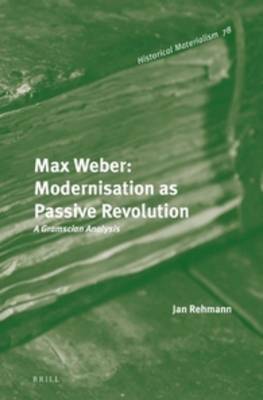Basing his research on Gramsci's theory of hegemony, Rehmann provides a comprehensive socio-analysis of Max Weber's political and intellectual position in the ideological network of his time. Max Weber: Modernisation as Passive Revolution shows that, even though Weber presents his science as 'value-free', he is best understood as an organic intellectual of the bourgeoisie, who has the mission of providing his class with an intense ethico-political education. Viewed as a whole, his writings present a new model for bourgeois hegemony in the transition to 'Fordism'. Weber is both a sharp critic of a 'passive revolution' in Germany tying the bourgeois class to the interests of the agrarian class, and a proponent of a more modern version of passive revolution, which would foreclose a socialist revolution by the construction of an industrial bloc consisting of the bourgeoisie and labour aristocracy.
(c) 1998 Argument Verlag GmbH, Hamburg. Translated from German "Max Weber: Modernisierung als passive Revolution. Kontextstudien zu Politik Philosophie und Religion im UEbergang zum Fordismus".
- ISBN10 9004271791
- ISBN13 9789004271791
- Publish Date 28 October 2014 (first published 23 October 2014)
- Publish Status Active
- Publish Country NL
- Imprint Brill
- Format Hardcover
- Pages 438
- Language English
- URL brill.com/product_id54689
